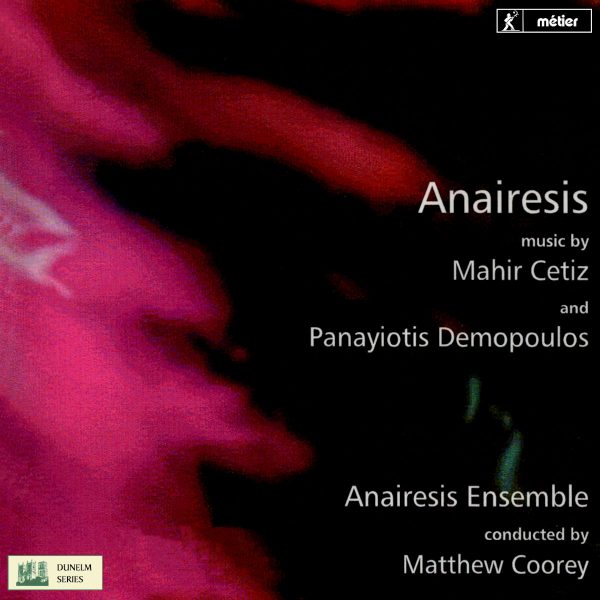Fanfare
Metier’s work to search out interesting, vibrant new music continues with this coupling of music by two composers who both studied with Anthony Gilbert at the Royal Northern College of Music in Manchester; in fact, the idea of this very disc was born while in Manchester. Both com¬posers were born in 1977, Mahir Cetiz in Ankara and Panayiotis Demopoulos in Athens (although he grew up in Kozani).
Mahir Cetiz takes a contemporary Turkish poem by Murathan Mungan as the starting point of his work Mist Bells (2002/3; also the title of the poem). The stasis of the poem is reflected in the music’s quiet surface, while percussion and piano introduce bell effects. It takes a certain kind of bravery to compose music as whispered as this.
Also at around a quarter-hour duration is Cetiz’s work for piano solo (here performed by the pianist himself), Triptych. The three parts are each inspired by one of the transcendental states of Anatolian Sufism: finding, losing, and Truth. The feeling for the color of harmonies demonstrated by Cetiz is remarkable. The intent is to imply whirling (presumably in slow motion often) via hypnotic expression. Performed by its dedicatee, Ates Kirkan, Polarization (2001) for solo bassoon is brilliantly executed. The composer seeks to explore the virtuoso possibilities of the instrument (multiphonics are particularly successful here).
The shift to the 1584 four-voice villota by Filippo Azzaiola that forms the basis of Demopoulos’sTheme and Variations is stark indeed. Demopoulos moves forward in history from 1584 to 2003 (the year of Demopoulos’s composition) in a step-by-step manner, so that each variation may be placed in a different historical era. Clearly Demopoulos’s mind works in a very different way from Cetiz’s. The scoring is for flute, English horn, clarinet, bassoon, and horn, an adapted wind quintet. Demopoulos’s Three Songs for Bass and Piano begins by setting Ceclia Meireles’s “Motivo,” a poem of what might be described as an altered state of contentment. The emotional state is constant stability, and bass Richard Wiegold is expert at projecting this before Demopoulos moves on to a setting of “Nothing There” by Ursula Vaughan Williams. Here, it is as if the meter is progressively undermined, indeed untethered. The final song sets Aeschylus (“Prometheus Bound”), an ominous, extremely low constant piano tolling seeming to underline the depth of the vocal writing. Unremittingly serious, it leads to the final item, Of Seventh Doors, a suite for cello and piano inspired by a performance of Bartok’s Bluebeard’s Castle. The seven movements reflect the seven doors of the opera, and there are other parallels (two major protagonists, for example) but the actual intent is to reflect the impression made on the composer by the opera itself. The sound world Demopoulos conjures up is often fascinating; certainly when the music whispers on the edge of audibility the effect is spellbinding. Claire Babington is the superb cellist, with the composer on the piano. This is a live performance, the tension telling.
The title of the disc is actually anairesis, and is defined as “the succession of thoughts intending to demonstrate that a specific idea, theory, belief or proof is flawed.” Apparently both composers’ aesthetics are defined by the idea of doubt; perhaps this acts as a compositional spur to them? Whatever the case, there are two individual voices here. Hearing them together enables us to appreciate the strengths of each of them. Fascinating and stimulating.
@divineartrecordingsgroup
A First Inversion Company
Registered Office:
176-178 Pontefract Road, Cudworth, Barnsley S72 8BE
+44 1226 596703
Fort Worth, TX 76110
+1.682.233.4978












